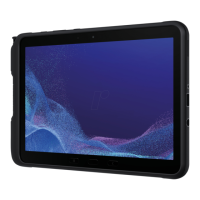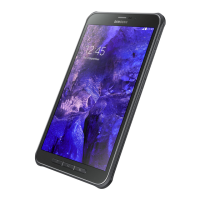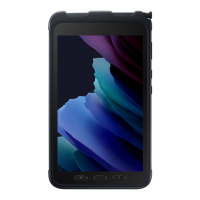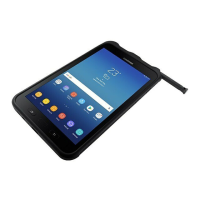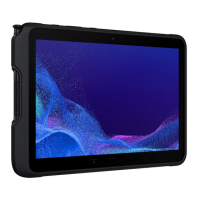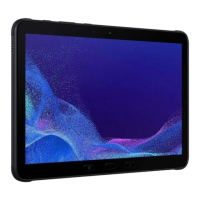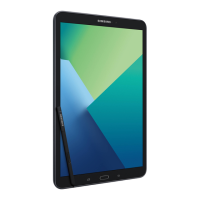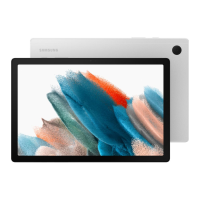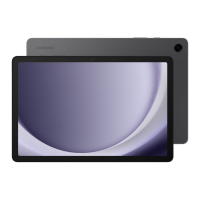Do you have a question about the Samsung Active4 Pro and is the answer not in the manual?
Identifies and explains the physical components of the device and their functions.
Details safety guidelines, potential risks, and precautions for device operation.
Explains physical buttons and how to customize Side and Active key functions.
Step-by-step guide for inserting and removing the device's battery.
Covers wired charging, quick charging, and tips to reduce battery consumption.
Important advice and warnings regarding safe battery charging practices.
Detailed instructions for inserting the SIM or USIM card into the device.
Guide to installing, removing, and formatting microSD cards for expanded storage.
Step-by-step instructions for attaching and detaching the device's protective case.
Guidance on inserting the S Pen into its designated slot within the protective case.
Instructions for powering on/off, forced restarts, and initial device setup.
Overview of the chapter detailing the device's applications and functionalities.
Details on signing in, managing, and signing out of a Samsung account.
Explains various touchscreen gestures like tapping, dragging, and pinching.
Description of Home and App screens and how to navigate between them.
Guidance on customizing the Home screen, including wallpapers, widgets, and app display.
Using Finder, moving items, and creating folders for app organization.
Using the Edge panel for quick access and managing lock screen settings.
Changing screen lock methods and understanding status bar indicator icons.
Managing device notifications and utilizing quick settings buttons.
Managing media playback and controlling smart devices via notification panel.
Details on the on-screen keyboard, input languages, and text entry.
Instructions for selecting, copying, cutting, and pasting text on the device.
Using Galaxy Store/Play Store and managing installed/disabled apps.
How to grant or deny permissions for apps to access device features and data.
Core functions for making, receiving, and managing voice and video calls.
Using speed dial, making international calls, and handling incoming call rejections.
Instructions for blocking unwanted calls and unknown/private numbers.
Creating, importing, searching, and syncing contacts with accounts.
Deleting, sharing contacts, creating groups, and merging duplicate entries.
Composing, sending, and viewing text and voice messages.
Viewing, sorting, deleting messages, and customizing message notification settings.
Using the Internet app for browsing, bookmarking, and private browsing.
Running multiple applications simultaneously in split-screen or pop-up view.
Creating app pairs, adjusting window sizes, and launching apps via Edge panel.
Overview of Bixby, Samsung's AI assistant, and how to initiate interactions.
Using voice commands and text input to interact with the Bixby assistant.
Using Bixby Vision for image recognition, text translation, and visual search.
Managing children's digital use and closing the Samsung Kids mode.
Information on Samsung's social initiatives and the Galaxy Shop for products.
How to create new events and sync them with your online accounts.
Creating, completing, restoring, and deleting reminders for tasks and to-dos.
Using the built-in Clock for alarms and the Calculator for computations.
Viewing device content on a large screen by connecting to a mirroring-enabled TV or monitor.
How to share your Bluetooth speaker with another person's device.
Enabling shared music listening experiences using compatible Galaxy Buds.
Steps to connect your tablet to smartphones and computers using the Samsung Flow app.
How to activate Daily Board and utilize its features like slideshows.
Customizing Daily Board for notes, music control, slideshows, and other preferences.
Connecting the tablet to external displays using HDMI adapters for Samsung DeX.
Steps to connect the tablet to a TV wirelessly for the Samsung DeX experience.
Using external keyboards and mice to control the Samsung DeX interface.
Using the tablet's screen as a touchpad or employing the on-screen keyboard.
Overview of the DeX interface and using the external display and tablet concurrently.
How to lock the DeX screen and properly end a Samsung DeX session.
Guidelines for handling and using the S Pen to avoid damage and ensure proper functionality.
Details on features available in Air Command, like Create note, Smart select, and PENUP.
Managing the Air Command icon and using Smart select for area selection.
How to select and capture portions of a video to create animated GIFs.
Reducing apps to thumbnails for quick switching and multitasking.
Previewing content or information in a pop-up window by hovering the S Pen.
Creating memos by writing on the screen without turning it on.
Steps for creating new notes, entering titles, and saving them in various formats.
Composing notes with handwriting, using the eraser, and editing handwritten content.
Adjusting the appearance and orientation of handwritten notes and drawings.
Converting handwriting to text and recording voice notes synchronized with written content.
Adding memos to PDF files and pinning notes to the Home screen.
Introduction to PENUP for sharing artwork and getting drawing tips.
Guidelines for responsible camera use and basic steps for capturing photos.
Adjusting camera settings, modes, zoom, and switching between front/rear cameras.
Using zoom, locking focus/exposure, camera button functions, and shooting mode options.
Using Photo mode and enabling shot suggestions for optimal composition.
Taking selfies, applying filters, and recording videos using different camera modes.
Capturing photos with a blurred background effect for portraits.
Manually adjusting camera settings like WB, EV, and ISO in Pro mode.
Using Panorama, Hyperlapse, and Food modes for specific photography scenarios.
Adjusting intelligent features, picture settings, selfies, and video options.
Configuring grid lines, location tags, shooting methods, and privacy settings.
Navigating the Gallery interface, searching for images, and grouping similar photos.
Displaying images, sharing, modifying, and cropping them within the Gallery.
Playback controls for videos, including brightness, volume, and screen ratio adjustments.
Organizing media into albums, creating stories, and syncing with cloud storage.
Recording voice memos and sharing various types of content from the device.
Methods for taking screenshots, including key capture and swipe capture.
Steps for starting, stopping, and configuring screen recording on the device.
Detailed guide for transferring data using a USB cable connection.
Methods for wireless data transfer and backing up/restoring data using external storage or PC.
Explains the purpose of the Settings app for customizing device behavior.
Managing Samsung account and configuring wireless connections like Wi-Fi, Bluetooth, NFC.
Activating Wi-Fi and connecting to wireless networks, including network quality info.
Sharing Wi-Fi passwords and establishing direct connections using Wi-Fi Direct.
Pairing with Bluetooth devices and transferring data via Bluetooth.
Using NFC for reading tags, making payments, and contactless transactions.
Setting up and using the NFC feature for mobile payment services.
Managing mobile data usage with Data Saver and setting apps to use mobile data exclusively.
Sharing mobile data as a hotspot and configuring advanced connection features.
Configuring printer settings, adding printer plugins, and printing documents.
Settings for Quick Share, Buds auto-switch, Call & Text, DeX, Smart View, etc.
Setting up device modes based on activity or location and creating custom routines.
Customizing ringtones, notification sounds, vibration settings, and volume levels.
Adjusting audio settings like Dolby Atmos and routing app sound to different devices.
Configuring app notifications, lock screen display, and display settings like brightness and dark mode.
Changing wallpapers, home screen layout, and lock screen appearance.
Setting up Smart Lock and managing device security, app scanning, and privacy.
Setting up face recognition and precautions for its use.
Tips for better face recognition accuracy and the process of registering your face.
Setting up fingerprint recognition and deleting registered fingerprint data.
Tips for better fingerprint recognition and the process of registering fingerprints.
Unlocking the device with fingerprints and deleting registered fingerprint data.
Registering biometric data for Samsung Pass to sign in to websites and apps.
Managing saved sign-in details and autofill for personal information in Samsung Pass.
Setting up Secure Folder for private content protection and managing its settings.
Moving files to Secure Folder, managing apps, and setting auto-lock conditions.
Adding accounts to Secure Folder, hiding it, and uninstalling the Secure Folder app.
Securing Wi-Fi connections, protecting data, and purchasing protection plans.
Selecting specific apps to protect using Secure Wi-Fi for enhanced data safety.
Managing location permissions and configuring safety/emergency features.
Adding accounts, backing up data to cloud services, and using Smart Switch.
Setting up and managing different user accounts and profiles on the device.
Switching between user accounts and managing existing user profiles.
Backing up and restoring device data using Samsung Cloud.
Configuring Google services and an overview of advanced device features.
Activating and configuring motion controls and gestures for device interaction.
Installing and managing a second instance of messenger apps for dual accounts.
Monitoring device usage and setting parental controls for children's digital activity.
Optimizing Device Performance
Checking and managing battery, storage, and memory status.
Scanning the device for malware and checking its security status.
Setting up auto optimization and updating device software.
Running device diagnostics and activating maintenance mode for privacy.
Managing installed apps, settings, and usage.
Language and Keyboard Settings
Selecting device languages, app languages, and managing keyboard settings.
Configuring settings to improve device accessibility for various user needs.
Checking for software updates and obtaining technical assistance remotely.
Accessing device information like status, legal info, software version, and battery.
Important precautions and guidelines for safe and proper device operation.
Touchscreen visibility, regulatory info, network bandwidth, and magnet warnings.
Explanation of instructional icons and notes regarding package contents and accessories.
Guidelines to preserve the device's IP68 water and dust resistance rating.
Causes and solutions for the device overheating while charging.
Reasons for device overheating during operation and recommended actions.
Steps to take if the device overheats and precautions for operating in different environments.
Solutions for common problems like entering codes, network errors, and device not turning on.
Resolving touchscreen malfunctions, device freezing, call connection problems, and resetting.
Resolving issues with microphone, sound echoes, network connectivity, and battery charging.
Resolving camera launch errors, poor picture quality, and multimedia file playback issues.
Resolving Bluetooth connection problems, brightness bar issues, and location finding errors.
Addressing data loss issues and managing device storage space effectively.
Legal information regarding copyright and registered trademarks of the product and company.
| Resolution | 1920 x 1200 pixels |
|---|---|
| RAM | 4GB |
| IP Rating | IP68 |
| Display Size | 10.1 inch |
| Operating System | Android |
| Expandable Storage | Yes, microSD |
| Connectivity | Wi-Fi 802.11 a/b/g/n/ac, Bluetooth |
